Obwohl WordPress mehr als 43 % aller Websites im Internet betreibt, ist es nicht das einzige Open-Source-Content-Management-System (CMS ) auf dem Markt. Es gibt andere beliebte Software-Optionen wie Joomla und Drupal.
Alle drei haben viele Gemeinsamkeiten und erhebliche Unterschiede. Jeder von ihnen ist ein einzigartiger Website-Builder mit Vor- und Nachteilen.
In diesem Artikel werden wir WordPress vs Joomla vs Drupal vergleichen, um herauszufinden, welches die beste Wahl für Sie ist.
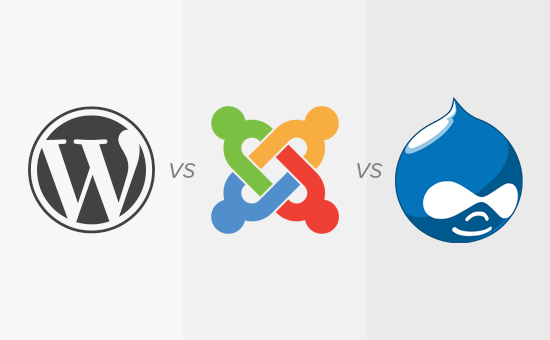
Hinweis: Wir vergleichen WordPress.org und nicht den Hosting-Service von WordPress.com. Bitte lesen Sie unseren Leitfaden über den Unterschied zwischen WordPress.org und WordPress.com.
Gemeinsamkeiten von WordPress, Joomla und Drupal
Alle drei populärsten CMS des Internets haben in Bezug auf Technologie, Philosophie und Community viel gemeinsam.
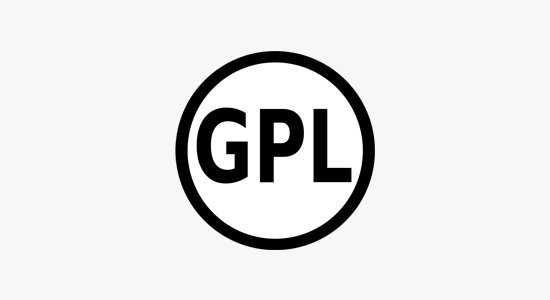
- WordPress, Joomla und Drupal sind alle freie und quelloffene Software, die unter der GPL lizenziert ist. In unserem Artikel “ Warum ist WordPress kostenlos?“ erfahren Sie mehr über freie Software.
- Alle drei sind hauptsächlich in PHP geschrieben.
- Sie alle unterstützen MySQL als Datenbankmanagementsystem. WordPress unterstützt ausschließlich MySQL, während Joomla und Drupal andere Datenbankmanagementsysteme unterstützen.
- Alle drei verwenden Themes und Templates für das visuelle Erscheinungsbild von Websites und Plugins, Module oder Erweiterungen für die Erweiterung von Funktionen.
- Da es sich um Open-Source-Software handelt, sind alle Projekte von der Gemeinschaft getragen.
Obwohl es viele Gemeinsamkeiten gibt, unterscheiden sie sich in vielen Aspekten.
Sie haben zum Beispiel unterschiedliche Richtlinien darüber, was in die Kernsoftware aufgenommen werden soll, wie mit Modulen und Vorlagen umgegangen werden soll, wie mit der Sicherheit umgegangen werden soll, usw.
Diese Unterschiede haben einen großen Einfluss auf die Nutzer und die Art und Weise, wie sie ihre Websites aufbauen.
Werfen wir also einen Blick darauf, wie WordPress, Joomla und Drupal im Vergleich zueinander abschneiden, damit Sie die beste Website-Builder-Plattform für Ihr Unternehmen wählen können.
Benutzerfreundlichkeit und Einsteigerfreundlichkeit
Die meisten Menschen, die ihre Websites erstellen, sind keine Webentwickler, Designer oder Programmierer. Sie sind durchschnittliche Benutzer, die einfach nur eine Website erstellen wollen. Die Benutzerfreundlichkeit ist für die meisten Benutzer der wichtigste Faktor.
WordPress
WordPress wird mit der berühmten Fünf-Minuten-Installation geliefert. Die meisten WordPress-Hosting-Anbieter bieten auch eine Ein-Klick-Installation von WordPress an. Dies macht es für einen neuen Benutzer ziemlich einfach, einen WordPress-Blog oder eine Website innerhalb von Minuten, nicht Stunden, zu starten.
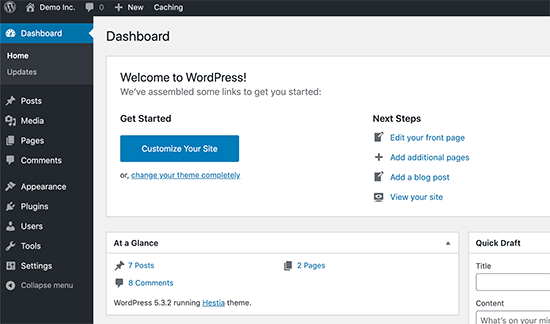
Die Benutzererfahrung nach der Installation von WordPress ist viel besser als bei Joomla oder Drupal. Der Benutzer sieht eine einfache, übersichtliche Benutzeroberfläche mit Menüs zum Erstellen von Beiträgen und Seiten oder zum Anpassen von Aussehen und Themen.
Joomla
Die Joomla-Installation mag nicht so schnell aussehen wie die von WordPress, aber sie besteht aus sehr ähnlichen Schritten. Abgesehen davon bieten viele Shared-Hosting-Anbieter auch Ein-Klick-Installationspakete für Joomla an.
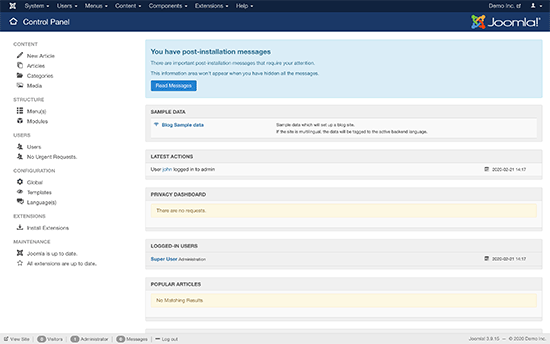
Nach der Installation landet der Benutzer auf einem Bedienfeld, das nicht so einfach zu bedienen ist wie WordPress. Es gibt einfach zu viele Menüs zum Anklicken und Anpassen der Website.
Joomla-Fans würden sagen, das liegt daran, dass Joomla viel leistungsfähiger ist als WordPress, aber wir glauben nicht, dass das stimmt.
Drupal
Die Installation von Drupal ist ähnlich wie bei Joomla und WordPress. Laden Sie einfach das Paket herunter und hoch und führen Sie das Installationsskript aus.
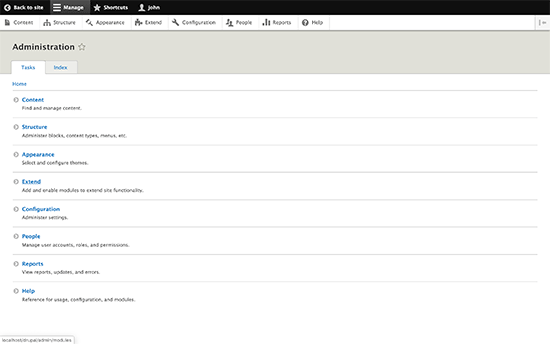
Drupal bietet auch Distributionen an. Dabei handelt es sich um vorgefertigte Drupal-Pakete mit Modulen und Konfigurationen zur Erstellung bestimmter Arten von Websites.
Die Erfahrung nach der Installation ist für absolute Anfänger ein wenig kompliziert. Die Benutzer werden es schwierig finden, herauszufinden, wie sie Dinge auf ihrer Website ändern können. Drupal macht es sehr offensichtlich, wie man den Inhalt hinzufügt, aber das Ändern des Aussehens und das Hinzufügen von Nicht-Inhaltselementen ist nicht sehr offensichtlich.
Gewinner: WordPress
Themen und Addons
Für alle drei beliebten CMS gibt es Themes und Plugins/Module, mit denen sich die Funktionen und das Aussehen der Software erweitern lassen.
Themes steuern das Erscheinungsbild Ihrer Website und wie sie für Ihre Nutzer aussieht. Plugins oder Module sind wie Anwendungen für Ihr CMS.
Schauen wir uns an, wie diese drei großen CMS-Programme in dieser Kategorie abschneiden.
WordPress
Mit WordPress können Benutzer das Erscheinungsbild ihrer Website mithilfe von Themes ändern. Bei WordPress sind einige Standard-Themes vorinstalliert.
Sie können jederzeit auf Ihrer Erscheinungsbildseite auf die Schaltfläche „Neu hinzufügen“ klicken und kostenlose WordPress-Themen aus dem offiziellen Themenverzeichnis von WordPress.org installieren.

Neben kostenlosen Themes finden Sie viele weitere Premium-WordPress-Themes, die von Theme-Shops Dritter wie StudioPress, Astra Themes, Elegant Themes und anderen entwickelt wurden. Diese Themes sind kostenpflichtig und verfügen über Premium-Support-Optionen.
Die wahre Stärke von WordPress liegt in den Plugins. Im offiziellen WordPress-Plugin-Verzeichnis gibt es mehr als 59.000 kostenlose WordPress-Plugins. Sie können auch Premium-Plugins kaufen, die von den Plugin-Entwicklern mit kostenpflichtigem Support angeboten werden. Schauen Sie sich unsere Liste der unverzichtbaren WordPress-Plugins an, um zu sehen, wie Plugins WordPress großartig machen.
Joomla
Genau wie WordPress verfügt auch Joomla über Vorlagen und Erweiterungen. Es gibt großartige Erweiterungen für so ziemlich alles, von der Erstellung eines eCommerce-Shops bis zur Verwaltung von E-Mails.
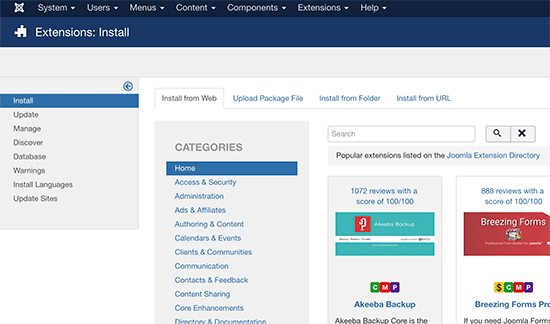
Allerdings ist die Anzahl dieser Vorlagen und Erweiterungen nicht so groß wie bei WordPress. Dies könnte die Suche nach der perfekten Vorlage und den perfekten Erweiterungen etwas erschweren.
Standardmäßig verfügt Joomla nicht über eine Funktion, die es Benutzern ermöglicht, Erweiterungen oder Vorlagen im Administrationsbereich zu suchen und zu installieren. Es gibt eine Erweiterung, mit der Sie die Funktion „Installieren aus dem Web“ für Erweiterungen hinzufügen können. Aber für Vorlagen müssen die Benutzer immer noch manuell nach Vorlagen suchen und sie dann installieren, indem sie ihre URL hinzufügen.
Drupal
Drupal hat das gleiche Problem mit der Verfügbarkeit von Themen und Modulen. Die Benutzer müssen ihre Website verlassen, nach dem Modul und dem Thema suchen, das sie hinzufügen möchten, und dann die URL der Zip-Datei des Projekts ausfindig machen. Schließlich können sie die URL auf der Seite Module oder Themes eingeben, um sie zu installieren.
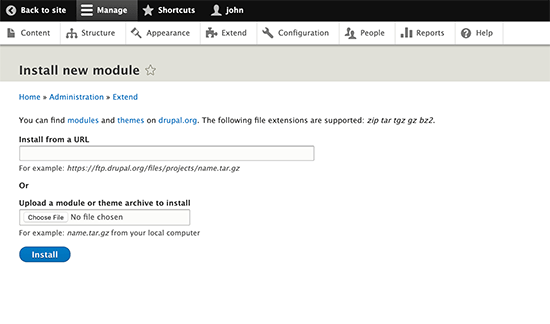
Es gibt Module für so ziemlich alles, und es kommen regelmäßig neue hinzu. Dennoch ist die Gesamtmenge der Module im Vergleich zu WordPress zu gering.
Gewonnen: WordPress.
Support-Optionen
Die Verfügbarkeit von Hilfe- und Support-Optionen ist für Einsteiger sehr wichtig. Es wird sicherlich einige Hürden geben, wenn Sie eine neue Software ausprobieren. Das ist in Ordnung, solange Sie Hilfe bekommen können.
WordPress
WordPress hat eine starke Gemeinschaft von Nutzern. Sie finden WordPress-Hilfe in offiziellen Support-Foren, Dokumenten, Handbüchern, Codex, Slack-Kanälen, Stack Exchange, der WPBeginner Engage-Facebook-Gruppe und fast jedem Forum im Internet über Webdesign und -entwicklung.
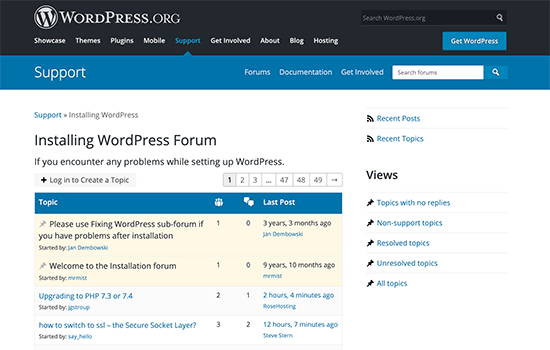
Es gibt Websites wie WPBeginner mit Hunderten von Tutorials, Video-Tutorials und Artikeln, die sich an WordPress-Anfänger richten. Es gibt viele Möglichkeiten, kostenlosen WordPress-Support anzufordern und zu erhalten.
Neben den kostenlosen Support-Optionen gibt es auch Möglichkeiten, bezahlten Support für WordPress zu erhalten.
Online-Plattformen wie WPBeginner Pro Services, Seahawk, Codeable, Upwork, Fiverr usw. sind nur einige der Orte, an denen Sie WordPress-Profis anheuern können, um Ihnen zu helfen.
Aufgrund der großen Beliebtheit von WordPress ist es für kleine Unternehmen und Privatpersonen einfach und erschwinglich , WordPress-Entwickler zu finden.
Joomla
Joomla hat, genau wie WordPress, eine große und sehr hilfsbereite Gemeinschaft. Es gibt eine umfangreiche Dokumentation auf der Joomla-Website, die eine wertvolle Ressource für Anfänger ist. Für mehr interaktive Unterstützung können die Benutzer Foren, Mailinglisten, Benutzergruppen usw. beitreten.
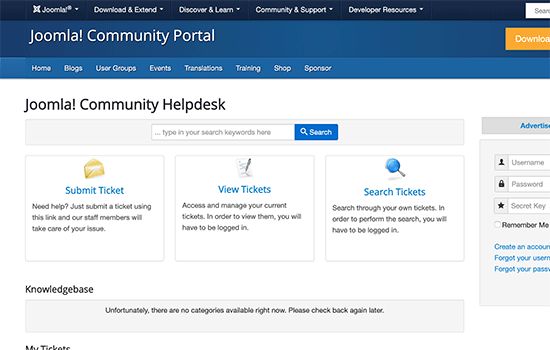
Neben der Unterstützung durch die Gemeinschaft gibt es auch Ressourcen Dritter, bezahlte Schulungen und Entwicklungsagenturen, die hilfreich sein können.
Im Gegensatz zu WordPress ist es für Joomla ziemlich schwierig, erschwingliche Expertenhilfe zu finden. Die Einstellung eines Entwicklers oder Experten für Joomla-Entwicklung, Fehlerbehebung oder Unterstützung kann viel mehr kosten als WordPress.
Drupal
Drupal hat eine sehr proaktive Gemeinschaft von Fans und Benutzern. Sie finden alle Community-Support-Optionen für Drupal genau wie für WordPress und Joomla. Es gibt eine umfangreiche Dokumentation, ein Support-Forum, Mailinglisten, Benutzergruppen und IRC-Chatrooms. Alles gute Orte, um Ratschläge und kostenlose Hilfe zu erhalten.
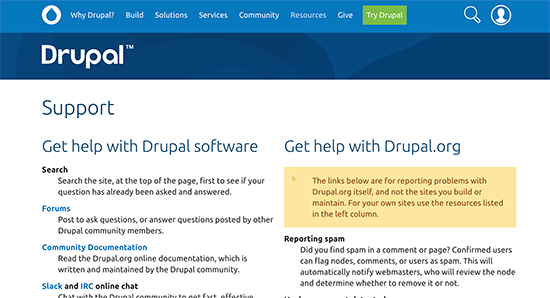
Drupal versucht, Nutzer mit Entwicklern und Unternehmen zu verbinden, die professionelle Drupal-Dienstleistungen anbieten. Sie finden sie im Drupal Marketplace.
Allerdings sind Drupal-Entwickler, ähnlich wie Joomla, im Vergleich zu WordPress sehr teuer.
Gewinner: WordPress
Lokalisierung und mehrsprachige Unterstützung
Ein großer Prozentsatz der täglich erstellten Websites sind nicht englischsprachige oder mehrsprachige Websites. Es ist viel wahrscheinlicher, dass viele Anfänger nach einem CMS suchen, das mit mehreren Sprachen umgehen kann oder Unterstützung für verschiedene Gebietsschemata und Sprachen bietet.
WordPress
WordPress bietet eine hervorragende Plattform für den Aufbau einer mehrsprachigen Website. Es unterstützt zwar nicht von Haus aus mehrere Sprachen, aber es gibt einige hervorragende Plugins, mit denen Sie ganz einfach eine mehrsprachige WordPress-Website erstellen können.
WordPress ist in mehr als 57 Sprachen verfügbar. Neue Sprachen können mit einem Klick aus dem WordPress-Administrationsbereich installiert werden.
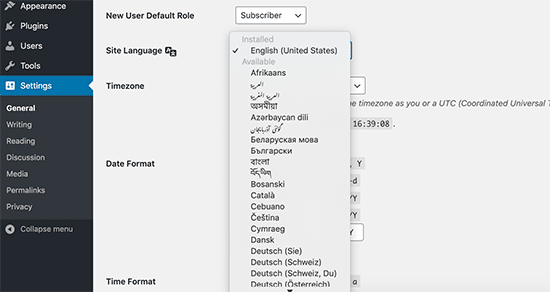
Die meisten beliebten Themes und Plugins sind auch in mehreren Sprachen verfügbar. Theme- und Plugin-Entwickler suchen aktiv nach Unterstützung bei der Übersetzung ihrer Pakete in andere Sprachen.
All diese Bemühungen machen WordPress zu einer großartigen Plattform für die Erstellung einer nicht-englischen oder mehrsprachigen Website.
Joomla
Joomla ist von Haus aus in der Lage, eine mehrsprachige Website zu verwalten, ohne dass eine Erweiterung installiert werden muss. Gehen Sie einfach zum Sprachmanager, fügen Sie eine Inhaltssprache hinzu und beginnen Sie mit der Erstellung mehrsprachiger Inhalte auf Ihrer Website.
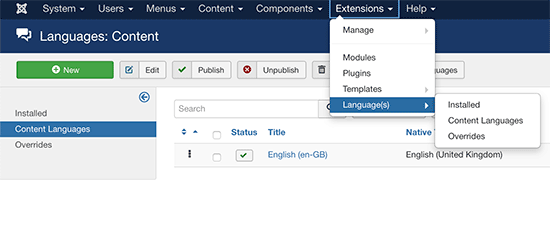
Übersetzungen sind auch für die Verwaltungsoberfläche in vielen Sprachen verfügbar und können einfach über den Verwaltungsbereich installiert werden.
Drupal
Drupal verfügt über integrierte Unterstützung für nicht-englische oder mehrsprachige Websites. Sie müssen die Module zur Lokalisierung und Inhaltsübersetzung aktivieren. Danach können Sie in der Konfigurationssektion von Drupal Sprachen für die Website und die Verwaltungsoberfläche hinzufügen.
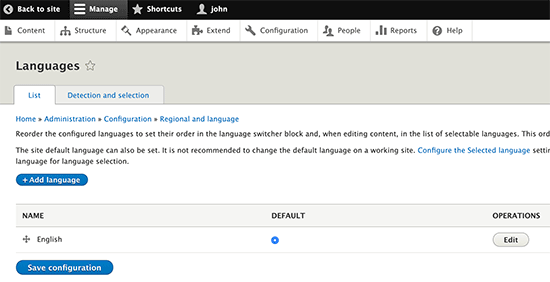
Sieger: Unentschieden – Alle drei unterstützen mehrsprachige Websites und sind in mehreren Sprachen verfügbar.
Sicherheit
Sicherheit ist ein sehr wichtiger Faktor bei der Auswahl eines CMS für Ihre Website. Fast jede Website im Internet ist anfällig für Sicherheitsbedrohungen.
WordPress
Da WordPress das beliebteste CMS der Welt ist, werden Websites, die auf WordPress basieren, häufig von Hackern angegriffen. WordPress ist jedoch auf einem sehr sicheren Code aufgebaut und reagiert sehr schnell auf Sicherheitslücken.
WordPress verfügt außerdem über einen Auto-Update-Mechanismus, mit dem WordPress-Websites automatisch aktualisiert werden, wenn es einen neuen Sicherheitspatch gibt.
WordPress-Websites können durch automatische Backups, Zwei-Faktor-Authentifizierung und andere bewährte WordPress-Sicherheitspraktiken zusätzlich gesichert werden.
Es gibt auch einen integrierten Mechanismus zur Anzeige von Updates für WordPress-Themes und -Plugins. Dies ermöglicht es den Entwicklern von Themes und Plugins, schnell auf Sicherheitslücken zu reagieren.
Joomla
Joomla ist WordPress sehr ähnlich, wenn es um die Sicherheit geht. Sie reagieren aktiv auf jede Sicherheitslücke und sind sehr schnell dabei, sie zu beheben. Die Pflege einer Website und die Installation von Updates ist jedoch nach wie vor Sache des Nutzers.
Es gibt Erweiterungen für die Sicherung Ihrer Joomla-Website. Sie können auch die Sicherheit Ihrer Joomla-Website stärken, indem Sie die gleichen bewährten Verfahren wie bei WordPress anwenden.
Drupal
Drupal verfolgt einen sehr ernsthaften Ansatz in Sachen Sicherheit. Sie veröffentlichen Sicherheitsschwachstellen auf ihrer eigenen Website, sobald sie entdeckt und gepatcht werden. Es besteht der Eindruck, dass Drupal sicherer ist, weil man nicht so oft hört, dass Drupal-Sites gehackt werden, aber das könnte daran liegen, dass es nicht so populär ist wie Joomla oder WordPress.
Der Gewinner: Unentschieden – Alle drei befolgen angemessene Sicherheitsstandards.
Schlussfolgerung:
Drupal, Joomla und WordPress sind allesamt fantastische Content-Management-Systeme. Drupal und Joomla verfügen über viel mehr integrierte Funktionen als WordPress.
WordPress übertrifft sie jedoch mit seiner Benutzerfreundlichkeit, seiner riesigen weltweiten Gemeinschaft, seinen Plugins und Themes. Wir sind der Meinung, dass die meisten Nicht-Entwickler es viel einfacher finden würden, mit WordPress zu arbeiten als mit Joomla oder Drupal.
Mit über 59.000 WordPress-Plugins können Sie nahezu jede Funktion hinzufügen oder jede Art von Website erstellen, die Sie möchten (ohne Code zu schreiben).
Gesamtgewinner: WordPress
Wie Sie mit Ihrem bevorzugten CMS beginnen
Unabhängig davon, ob Sie sich für WordPress, Joomla oder Drupal entscheiden, benötigen Sie einen Domänennamen und Website-Hosting, um eine Website zu erstellen.
Glücklicherweise haben alle drei dieser Top-CMS-Software ziemlich ähnliche Anforderungen, was bedeutet, dass alle Top-Webhosting-Unternehmen sie unterstützen.
Wir empfehlen, entweder Bluehost oder SiteGround zu verwenden. Beide gehören zu den größten Hosting-Unternehmen der Welt und sind auf das Hosting von WordPress-, Joomla- und Drupal-Websites spezialisiert.
Weitere Empfehlungen finden Sie in unserem vollständigen Webhosting-Leitfaden für Anfänger.
Wenn Sie mit WordPress beginnen, lesen Sie unseren Leitfaden für Einsteiger , wie man eine Website erstellt, mit schrittweisen Anweisungen.
Wir hoffen, dass dieser Artikel Ihnen geholfen hat, WordPress vs. Joomla vs. Drupal zu vergleichen, um das beste CMS für Ihre Website zu finden. Vielleicht interessieren Sie sich auch für unseren Vergleich der besten E-Mail-Marketingdienste und der besten Live-Chat-Software für kleine Unternehmen.
Wenn Ihnen dieser Artikel gefallen hat, dann abonnieren Sie bitte unseren YouTube-Kanal für WordPress-Videotutorials. Sie können uns auch auf Twitter und Facebook finden.




Syed Balkhi says
Hey WPBeginner readers,
Did you know you can win exciting prizes by commenting on WPBeginner?
Every month, our top blog commenters will win HUGE rewards, including premium WordPress plugin licenses and cash prizes.
You can get more details about the contest from here.
Start sharing your thoughts below to stand a chance to win!
mohadese esmaeeli says
Certainly, I have no intention of getting involved in any CMS war. However, based on my experience (as I worked with Joomla for 3 years), WordPress can provide better feedback in any field for large websites. Typically, and proven, more than 60% of websites worldwide use WordPress, while less than 15% use Joomla. In general, WordPress has a beautiful world for itself. Of course, before choosing a content management system, we must consider the nature of the website. Still, given the amazing advancements that WordPress has made and the plugins developed by major global companies, WordPress can now be used for any type of website.
Jiří Vaněk says
I tried all three editorial systems and from my own experience wordpress is good especially for beginners to learn how to work with the website and understand the basic principles. WordPress seems to me to be the most versatile and most importantly, in the event of a problem, it has a huge user base who are happy to help solve the problem for free.
Priya Sinha says
Thanks for the post, nice information about WordPress vs. Joomla vs drupal which one is better… it is really helpful. I will recommend it to others.
WPBeginner Support says
Glad you found our comparison article helpful!
Admin
Tom Hardy says
Great information! Based on my experience, in my opinion, WordPress is the easiest content management system that is highly customizable. On the other hand, Drupal is complex, but it is best for creating advanced websites; it is also a very secure CMS. Joomla lies in between these two CMSs on customizability, ease of use, and security fronts.
WPBeginner Support says
Thanks for sharing your opinion
Admin
Duane Hamann says
I think this article is right. For the unskilled guy looking to set up a respectable managed website, WordPress is the best option. But it has limits that Joomla have overcome. For someone skilled in CMS development, Joomla rates #1 for it’s flexibility with custom developed components, it’s far more technical so to the guy looking for something decent and easy to understand, WordPress win. That however, doesn’t shine light on WordPress when compared to Joomla. All it says, for those with no developing skills, WordPress is the best. For those who develop PHP applications, Joomla is more adaptive and flexible, so it all depends on the individual skills.
Vast says
I have created numerous sites and have used all three contenders. I find Joomla the most versatile and agile to use especially for larger complex sites.
But even for small sites, Joomla is super easy to use.
I think WordPress is more suitable for blogging and for commenting and it’s fine for smaller sites. It’s just not as easy to fine-tune as Joomla.
Ronald says
if you want something not complex and limited for a web page use wordpress.
If you want something complex and not limited to developing websites use Drupal.
Drupal is better!
Okanime says
How to know a guy „good with computers“ posing as a web designer – when he tells you he will build your site with a wordpress CMS. If you find Joomla hard to use or maintain, seriously you should stop using any form of electronic device. It is your obligation to do us all that solid.
Mark says
A website about WordPress says that WordPress is the best … What a surprise…
Jiten says
I was using WordPress since 2010. Being a web designer I always design and deliver website in WP but some years before some wabsites got hacked. Remember once your website hacked there is only one solution to remove infection completely „DELETE EVERYTHING“ because once you attacked then no plugin will clear everything.
Now I’m switching from WP to Joomla.
Okanime says
Joomla is beautiful. I don’t understand why it gets a bad rap. Joomla 3.x is now miles better than WordPress in every aspect.
Duarte says
Comparing Drupal and WordPress is like comparing a car to a boat, or apples with onions. They both best in their own scope. Depending on various factors you should use one or another but this should be for another article.
I use both and for me one thing that WP is not so good are the plug-ins. It’s true that WP has thousands of great plug-ins, but most of them are repeated in functionality and others are fremmium, meaning you have to pay if you want the full product. Also they tend to be turnkey solutions with no scalability in mind. And the same happens with themes.
Drupal has a strict policy of non repeated contributed modules and they are all free (Open Source), no fremium modules or themes are allowed. The modules in Drupal are more like bases so you can develop your functionalities with your own code or with other modules. A good part of drupal modules don’t have visible outputs they only serve as backend connections between functionalities.
Can’t talk about Joomla. No experience in it.
Mark says
While WP may have by far the biggest range of themes and plugins, most of their themes are pure repetitions and duplications, boring in general and created with very little creativity used.
The same goes with WP plugins. To make this even worse, you have to argue with an army of ross-blaming plugin developers, each of them assuring your broken website is the result of „another‘ plugin installed, nothing to do with them.
Ever heard of the saying; „too many cooks destroy the dish“?
That applies a 100% to WP.
I’d never use WP, not even if it was the last remaining CMS on the planet. Full of bugs, incompatible plugins, huge security vulnerabilities, lifeless designs, and a million of incompetent code hackers all pretending they are „professional web-programmers“.
Sam says
I totally agree with you.
Paul says
I’ve never had any security issues with WordPress, and regarding „lifeless designs“ – if you have the relevant skills (or hire a competent designer) the only limit to how your WordPress site looks is your imagination.
Stick with well established (and supported) themes and plugins, and you can’t really go wrong.
Bizzo says
You can make a fairly nice looking website with WordPress, however what becomes evident fairly quick is that it’s a blog and it’s nearly impossible to get past that. If you want a blog, great! If not, it will take an enourmous amount of time and energy to tailor it to be something other than a typical blog.
By the way, someone mentioned WNBA being wordpress. Note, NBA.com is Drupal.
Nikola says
I can agree that WordPress is most popular than Joomla, but not that is better.
The popularity of WordPress is due to negative campaign being waged against Joomla.
The internet is overflowed with articles like this one where some people talking absolutely lies and nonsense’s about Joomla.
Regards
Fred says
For those who want to migrate from Drupal to WordPress, they can use the free tool FG Drupal to WordPress
PATRICK MUSUMINA M. says
WordPress offers more use interface than Drupal and Joomla
Niels Klint says
Absolutely wrong
Nikola says
I agree.
Alex says
Not for a client. We always develop custom themes using different CMSs and the clients always prefer WordPress to edit their site. Because it’s easier for them to understand due to the user interface.
Frank Yusuf says
Wp is a good content management system it simplifies web design with it’s diverse themes and pluggins. in the past web design used to be a herculean task but with the coming of wordpress code became poetry.
greg says
WordPress does an excellent job at offering a GOOD PLATFORM to build a MULTILINGUAL site. It does NOT SUPPORT multiple languages out of the box, but… Yes, awesome platform!
Rahul says
wow… after reading this tutorial i should set up wordpress for my blog
waqas says
i am using joomla and then yt frame works in joomla. i think for advance sites joomla is better due to ease in creating new module positions and other customizations with themes and modules as well. although for small blogs wordpress is better. but in joomla if you are pro i think you can create even more good blogs in joomla
Joris says
I agree, thousand more options for many different blog types on one site without any coding. Try that in wordpress and you need to create multiple themes or use pagebuilders.
For wordpress you need allot more knowledge for customizing settings in blogs.
Out of the box and media is wordpress i winner. Multilingual is not in wordpress and WPML is a pain in the ass
Darren says
I’ve used a number of CMS’s over time and by far the worst one I ever found was WordPress. I’m very surprised that it came up top and even more surprised that it came up high for security.
I’ve found a number of stupid security issues with wordpress – for example if you don’t know what your doing and build a site someone can easily add some GET variables to the end of WordPress sites and easily use that to retrieve the username of the site owner – ok the password is still hidden but any hacker is half-way there.
I normally use Joomla for web design as I find it easy, but then again I spent many years learning C++ at University and have converted that knowledge into PHP.
As for Drupal, I’m just learning bits of Drupal at the moment and I have to admit some bits of it look really good. The only bad thing I find is the cache when trying to design a template the cache does get in the way a bit. Also it seems strange to have sub-themes off from main themes.
I recently came across a nightmare with the adaptive theme as I wanted to modify the menu code slightly, so I copied what I thought was the menu code (it was adaptivetheme_menu_tree and adaptivetheme_menu_tree (you’d guess that is what makes the menu seeing as it’s title contains the word MENU!!)), it turned out to do nothing – I don’t even know what that section of code does. Instead I found it mixes the primary menu up with adaptivetheme_links which is also used by multiple other functions – and there wasn’t even any proper way to split them so I had to figure it out by querying what the heading ID is and if it’s primary_menu it must be the menu I’m after.
Unfortunately though I’m in a company that has a website based on Drupal and thinks Drupal is the best thing since sliced bread so I have to try and work with it. Hopefully the more I use Drupal the more I’ll figure it out – I’ve already created a shortcut link to the sites/all folder as that was bugging me having to go through all those directories just to get to where I can edit (in Joomla it’s just straight in, into the templates folder and you’ve got all your themes and overrides waiting there for you!)
Heidi says
Hi Darren. It sounds like you’ve got a great deal of Joomla experience and this is a bit off-topic… However, I’ve got a Joomla 1.5 site that needs to be updated to a responsive theme for a nearby non-profit. I’m more of designer than a web programmer. Any suggestions on the best way to do this — or any suggested do’s and fonts before I get started?
Thank you.
Syahir Roslan says
As far as my experienced with Joomla, it’s really hard if you’re upgrading from Joomla 1.5 or 2.5, it’s not impossible but it will succeed with many errors so i’m suggesting that it’s best to migrate the content and use the latest Joomla as its support more responsive themes and modules. And also WordPress is the worst and didn’t try out Drupal yet.
Darren says
Hi Heidi
I’ve not used Joomla 1.5 in many years, most of my sites are based on Joomla 3.x as that is possibly the most responsive of them.
Your best bet if you want to make a site more responsive is to look into the Boostrap API and include Bootstrap CSS as quite a lot of responsive menus and columns can be created with bootstrap and they automatically convert to look good on both mobile phones and desktop screens.
As for going from one to the other – I would strongly suggest making a backup of your entire site before starting (including the SQL database), and maybe building the new site in a test location first before over writing the existing site (for example create it in a temporary folder first, make sure it all works and then move the site to the main folder – and don’t forget to change configuration.php with the new location details – and if you’ve used a different SQL server change the SQL server details too in configuration.php although if you just built it in a separate folder on the same host the SQL settings shouldn’t need altering).
Also look at using the latest edition of Joomla – at present that is 3.6.2 – as that gives you the latest version with the latest security issues fixed and future upgrades should be easier, as of Joomla 3 they have made the upgrading process quite simple and easy to retain existing data, but going from 1 to 3 may mean you’ll have to copy and paste most of the original site if you want it to have the same data.
Scott... says
Of course WordPress came out on top, its a WordPress beginner site, you didn’t really expect the review to be objective. It’s basically a sales pitch where only the good points are elaborated.
Brian says
I use both WordPress and Joomla for a long time now and Joomla, while having some nice features over WordPress, suffers heavily from the lack of good extentions (esp. free ones). Sometimes it takes me hours to find the right one and make it work which never happens in WordPress where I can search and when I find, there is a good support and documentation for it. Not to speak that some features don’t work so well in Joomla, like uploading pictures to gallery can be a real pain. Therefore, making a Joomla site look and work the way you want is more a matter of luck than effort, however, when you get there, it works well, even a bilingual support is great. Also, using publishing extentions like K2 can complicate things, a lot. I’d definitely recommend WordPress to beginners and Joomla to more advanced users and experienced website designers.
Niels Klint says
„Therefore, making a Joomla site look and work the way you want is more a matter of luck than effort, however“
Absolutely wrong – but the more opportunities there are in a system, the more you must be able to exploit the opportunities
Petr says
I use to build sites with WordPress and Joomla! but mostly when I finished website built with WordPress, client asked for some new specific feature which was not easily implemented in WordPress (sometimes it was not possible) so then I reworked the site in Joomla!. Even WordPress is popular, simple and easy I mostly use Joomla! because of its complexity and option to easily and powerfully customize the code (as there are great and modern code techniques which can be easily extended). But I like them both – WordPress for really simple websites (blogs) and Joomla! for complex websites.
bill says
You said „Almost every website on the internet is vulnerable to security threats.“. I would say you should revise that statement and say EVERY website is vulnerable to security threats. If it has an IP address, than it’s vulnerable.
Bucur says
I’ve used all big three systems (WP, Drupal and Joomla) in a corporate (big) environment.
From a *user* point of view, I hated Drupal with the heat of a thousand suns. I found it clunky, restrictive (and not in a good way) and just plain bewildering at times. Of course, I admit I was biased coming to it because I’d already used J! and WP extensively and also another “real” enterprise CMS and was expecting a similar experience.
And, as a someone who used to work for a govt dept that adopted Drupal – it wasn’t because it was secure, it was because “the White House uses it” and it was “free”, and both those reasons are so flawed they are silly. *eye roll*.
After my experience using Drupal on big internet and intranet sites, I would never consider using it seriously again. Out of the box and even after extensive modifications and add-ons, it couldn’t do timed publication, you couldn’t work on a draft version of a page (and save the draft) and so many other niggly user end problems that it just made my website life miserable.
After using WP for the last few years though, it’s my go-to system for publishing sites, mainly because it is so easy to teach other (non-technical) users how to use it and security can largely be addressed if a bit of care is taken from the beginning.
Paddy says
Hi, I’ve been a front/backend programmer for for personal projects for years -and I’m now thinking of starting to create websites for clients. Allowing ’non techies‘ the ability to update the websites after delivery is all a bit new to me. It only really started to sink in after making a website for a friend and her casually saying ‚how do I update it?‘. I am right in assuming that WP, J! and Drupal are suitable for professional website delivery for clients? If it’s partly a case of them being free, are there any others that you would recommend to use, albeit at a cost?
K Johnson says
Hmm… a site called wordpress beginner declaring wordpress the winner in every category except one. Not very objective IMO.
Brooks says
When you look at functional scalability and the architecture of each of the reviewed products, there is no comparison. None.
WP was initially designed as a simple blogging tool, and was then revised to handle CMS-like features:
– The various popular plugins to handle basic editing, structure and extended CMS features frequently overlap and conflict with each other.
– The structural scalabiity of WP pages and blogs is a function of plugins, not the underlying WP architecture.
– It is painfully apparent that a lot of the admin, design, etc. features of WP were added after-th-fact. The underlying blog-centric architecture makes it very difficult to add CMS capabilities in a way that is intuitive.
Drupal, on the other hand, was designed from the bottom up to scale functionally. The obvious trade-off is the learning curve.
But, in my experience, the lost productivity working with WP’s weak architecture (esp when attempting to implement more complex functionality) or dealing with conflicting 3rd party components, exceeds the Drupal learning curve.
So, perhaps a better qualifier when doing this comparison would be:
– If you need a simple blogging tool, WP is probably the most appropriate.
– If you need a robust CMS tool, then Drupal is the most appropriate.
IMO, Joomla is a compromise solution – not the easiest for basic blogging and web design, but not the most robust for CMS functions.
Just sayin…
Keith says
The problem I’ve too often experienced with WordPress is that, while it clearly has more plugins than the others, so many of them, even premium ones, are developed with a ‚yeah, this sort of meets the requirement‘ mindset, and ‚If they want something to do what they really want, they’ll have to pay us more money.‘ I see this time and again with a current WordPress/WooCommerce solution I’m working on for a client. They want it in WordPress. I’m going to give it to them in WordPress, but it shouldn’t be this frustrating.
Mustafa says
Thanks for this comparison very useful.
Edujobsbd says
I think WP is better than three.
SREERAJ says
Thanks for the article.
I really forced to add this comment, WordPress is WORSE in terms of security and clearly Drupal is the winner there.
Vladus Wizard says
Hello. This article is subjective opinion of author. All of that CMS have pluses and minuses. I noone can answer this question of what CMS to use. It depends on specific case.
Fordiy says
For professional purpose, must be Joomla. I was so disappointed when I first install wordpress. Actually wordpress is NOT good for commercial site.
Atanas says
Why?
Mervink says
Interesting, why would you say it’s not good for commercial use, I mean, A lot of digital agencies would prefer working in WP, despite the security factor I really don’t mind using it for commercial purposes
Amanda says
If I may, although I am not the most experienced user, I’ve done my research and, as had been pointed out in other comments, WordPress was designed to be a blogging tool and nothing more. It was NOT intended for commerce. They now have plugins to make up for that lack of functionality, but to compare that to a CMS that has that functionality right out of the box, such as Drupal or Duda, WordPress is obviously going to lose. Of it requires an extension, it is nearly a guarantee that it simply won’t work as well as if it were part of the base coding. There are indeed a lot of commercial sites that use WordPress, but as another commenter is experiencing, that is often because it was requested by a business owner who doesn’t know any better and it makes life considerably harder than it needs to be for the developer. Will the developer be ABLE to make a commercial site with WordPress? Certainly. Will it be as easy as it should be? Probably not (though, once you’re used to it, it likely won’t seem like a big deal, especially if you haven’t used another CMS for the purpose). And they will typically charge their client more money for their trouble.
Mickaël andrieu says
Hi, nice article.
Also, I don’t think we should consider only the three major CMS when we have to build a website: there is a CMS for each specific need.
For instance, I work with a new CMS based on Symfony components and a powerful on page editing system: BackBee
So, don’t be shy and check all theses new „next gen“ CMSes
Allan Philip says
Thanks for the enlightenment about the 3 CMS platforms. I’ve always used WordPress because of the ease in setting up, editing and installing plugins on a blog. To me, WordPress is the King of blogging platforms for the simplicity of ease to install and create blogs.
EMM says
I began my web development career using Dreamweaver/HTML.. WordPress at the time was a great blogging platform, but to make a website with it was very difficult. I first tried Joomla out of all 3, but it was so unintuitive, I couldn’t get the grasp of CMS and how it worked. Then a friend suggested Drupal, which I used exclusively for more than 3 years. I loved the flexibility and power of Drupal, and the control I had over content types, views, permissions, etc… Customizing and updating are the two banes of my existence, however, when it comes to Drupal. If those two items were as easy as WordPress, I would probably never leave Drupal because I can do so much more with it.
Then about 3 years ago I was hired to work on some WordPress sites – kicking & screaming, I should add – but once I saw that it had come a long way, I have started using it for most of the websites I build, because of the ease of updating and customizing. I still think security is a bit sketchy, but in reality, no CMS appears to be 100% secure.
I do like Drupal better, but end up using WP because of the items I mentioned above.
Shannon McNaron says
I think you forgot to consider which can actually handle large amounts of content. If a site is small and stagnant maybe WordPress is best but when it grows I think they will move to the bigger guys, so why not start learning and working with the right CMS from the start?
Bruce says
I guess no one told newyorker.com and thenextweb.com that WordPress can’t handle large amounts of content.
Those are just 2 examples of large content, high traffic websites using WordPress successfully
edvard eidem says
As a professione webdeveloper for many years. let me vioce my opinion.
I agree thet WP is the most easy CMS of the three, but a very important aspect is totally missing: SECURITY. If you have a large business which depend on your website 100% you really need to tighten the security by all possible ways. Even then, WP is not more than 95% tight.
Security is one of my main concernes and for my largest client (a large mediahouse) I will never ever concider WP. I use less known CMS’es wich are not on the hackers lists.
One of my previous clients just got hacked even with a PRO firewall and a 13 string generated password.. It was done through a plugin. The plugins and templates are very often to blame.
Joomla by the way is not safe either. FInd something else. My vote for security goes to CMS Made Simple. Never I have even heard of a CMS Made SImple site getting hacked.
Also, a voting by a WP-site such as this is highly biased so really you need to search reviews from a non-biased site.
Regards E, Norway
edvard eidem says
I can not edit the post, so I will have to add a comment by myself.
Security is not totally missing, my bad.
My point is, that WP is not safe enough out of the box. Joomla neither.
E. Norway
Joris says
I have over 100 joomla sites to manage, 2 times i was hacked. 1 was not on my server and outdated, other was outdated for 7 years.
Joomla is secure but using plugins can cause problems (:
With wordpress i have had a few hacked sites to fix and they where always outdated (:
Santhoshveer says
wordpresss is best ever My best cms we can create a website like blogs,download sites’s,shopping carts,social media website’s with custom our coding plugins and themes
Rikáryo Mourão says
Use the 3 CMS and that always gives me trouble is WordPress, including the upgrade process is always complex in the WP and customers have asked me Crackers opinion to solve problems and Joomla! today this intact as it says security breaches.
Just think the result was biased.
Zaki Honey says
thanks for the great comparison, i have a question, why almost all company’s want to use joomla instead of wordpress ? i see that a lot when they look for programmer or someone to make a website for them they want joomla ?
flankerp says
I think because in Workdpress you can not manage policy settings, you can’t have different access rights for group of users. I use both WP and Joomla 3. For small easy sites WP is better as it is much faster. However if you need to manage access rights different groups and create policy then Joomla is the answer.
In my opinion, these are two different products. WP is for blogging and Joomla is the proper CMS system. They are different and you can’t compare. On both you can get some commons but they are different and in my opinion you can’t sa this one is better then that one.
WPBeginner Support says
WordPress comes with a robust user role management system. It can be easily extended using a plugin and developers can create any combination of permissions they need.
Admin
Silvio Jesus says
Heh, I’ve obviously expected that a wp dedicated website would make wp the winner of such comparison.
Although I do agree with almost on the article, there isn’t a tie on the multilingual aspect. Wp, out of the box, does not give the user a multilingual platform, and just the aspect that you have to get a plugin to do so makes it a loser on that category.
So… The article was pretty spot-on until you got your „wp-fanboy feelings“ cloud your judgement.
PS: I do think wp is the better of the three, but that doesn’t excuse biased articles.
Best regards,
S.J.
Fernando says
What about scalability? I had WordPress sites that couldn’t handle well lots of traffic. Can you tell which one is best for scalability and make a ultra video tutorial with all steps to make a really really scalable WordPress site, one that we can put on a TV ad and get thousands of click at once?
Best
nero of Intuitive Design says
I am with Fernando about scalability. Also, I like the review as it is focused on non-developers and is very clear. However, I would have loved a section on advantages of each. WordPress wins in the sections you choose; however, as a developer (and I have installed and played with all platforms; but have not actively used them all for development – mainly wp development right now), I would love to know the advantages and the strengths of the other two platforms of when they would be worth looking into for development of specific websites.
Thanks,
Tamer
Jon says
A site that can’t handle lots of traffic is experiencing a hosting issues, not a WordPress issue. Examples of WordPress sites that get tons of traffic: WNBA site, Mashable, The San Francisco Examiner, Garth Brooks website, Mercedes Benz, lots more here: https://wordpress.org/showcase/archives/.
John Lewis says
I agree…. Or it’s a local issue. i.e. you internet connection.
Cliff says
Fernando, scalability is largely a product of the hosting environment (server resources, bandwidth, load balancing, etc…) and not the web site software itself. I doubt that’s all going to get covered in one video.